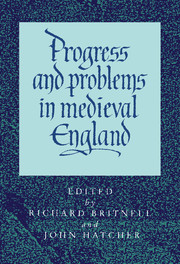Book contents
- Frontmatter
- Contents
- List of figures
- List of maps
- List of tables
- List of contributors
- Edward Miller: an appreciation
- List of abbreviations
- 1 Economic development in the early twelfth century
- 2 Lothian and beyond: the economy of the ‘English empire’ of David I
- 3 Boroughs, markets and trade in northern England, 1000–1216
- 4 Peasant deer poachers in the medieval forest
- 5 The growth of London in the medieval English economy
- 6 The bankruptcy of the Scali of Florence in England, 1326–1328
- 7 The English export trade in cloth in the fourteenth century
- 8 A medieval tax haven: Berwick upon Tweed and the English crown: 1333–1461
- 9 Taxation and communities in late medieval England
- 10 Peasants and the collapse of the manorial economy on some Ramsey Abbey estates
- 11 The famuli in the later Middle Ages
- 12 The great slump of the mid-fifteenth century
- 13 Lorenzo de' Medici's London branch
- 14 The trade of late medieval Chester, 1500–1550
- Bibliography of Edward Miller's published works
8 - A medieval tax haven: Berwick upon Tweed and the English crown: 1333–1461
Published online by Cambridge University Press: 05 June 2012
- Frontmatter
- Contents
- List of figures
- List of maps
- List of tables
- List of contributors
- Edward Miller: an appreciation
- List of abbreviations
- 1 Economic development in the early twelfth century
- 2 Lothian and beyond: the economy of the ‘English empire’ of David I
- 3 Boroughs, markets and trade in northern England, 1000–1216
- 4 Peasant deer poachers in the medieval forest
- 5 The growth of London in the medieval English economy
- 6 The bankruptcy of the Scali of Florence in England, 1326–1328
- 7 The English export trade in cloth in the fourteenth century
- 8 A medieval tax haven: Berwick upon Tweed and the English crown: 1333–1461
- 9 Taxation and communities in late medieval England
- 10 Peasants and the collapse of the manorial economy on some Ramsey Abbey estates
- 11 The famuli in the later Middle Ages
- 12 The great slump of the mid-fifteenth century
- 13 Lorenzo de' Medici's London branch
- 14 The trade of late medieval Chester, 1500–1550
- Bibliography of Edward Miller's published works
Summary
On 20 July 1333, Edward III received the surrender of the town of Berwick upon Tweed. The town had been in Scottish hands since 1318, but with the renewal of Anglo-Scottish warfare in 1332 its recovery became one of Edward III's main aims. The English laid siege to the town in early April 1333, and on 15 and 16 July the English commander entered into agreements with the commander of the garrison and the warden of the town that if the town were not relieved by 19 July it would be surrendered to the English. The Scottish relieving force was defeated by Edward III at Halidon Hill, two miles north-west of the town, on 19 July, and the following day the town capitulated.
The surrender, however, was not unconditional. Under the terms of the agreements made on 15 and 16 July, all the inhabitants of the town who did not wish to enter the allegiance of the English king were free to leave with their families and possessions, while those who were prepared to give their fealty to Edward III were permitted to remain in the town and peacefully reside there. Furthermore, the burgesses of the town were guaranteed ‘all their franchises, usages, laws and customs had and used in the time of king Alexander (III)’, and their property in the town was to be held in accordance with the law of Scotland.
- Type
- Chapter
- Information
- Progress and Problems in Medieval EnglandEssays in Honour of Edward Miller, pp. 148 - 167Publisher: Cambridge University PressPrint publication year: 1996
- 3
- Cited by



